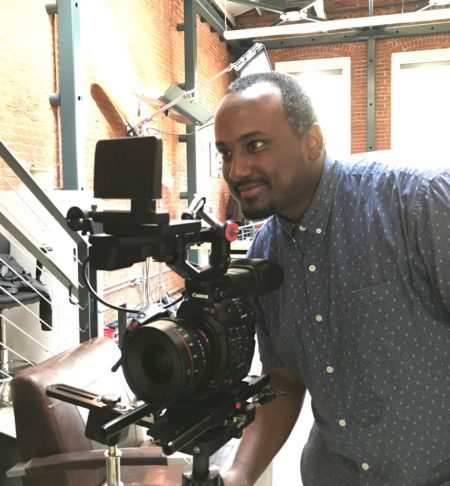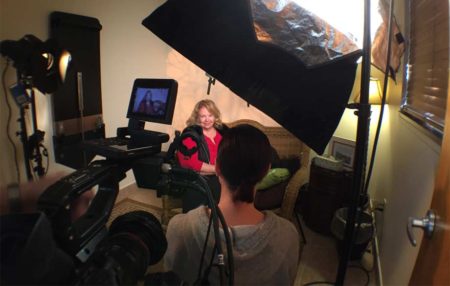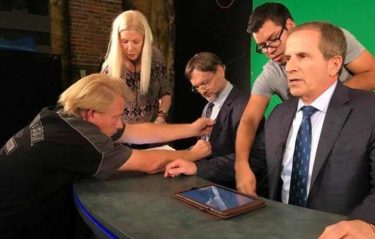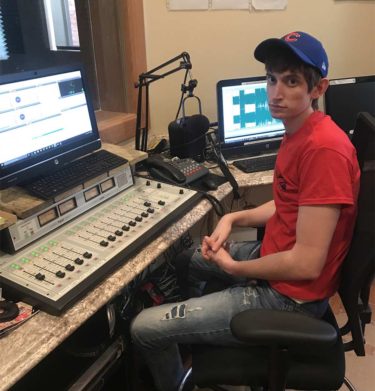Please fill out the following information, and RRFC Admissions will contact you to discuss our program offerings:
Issue #168
by L. Swift and Jeff McQ
 Sometimes, you find your chosen path by walking the wrong one for a while. For Film Connection student Brooke Tadesse, he tried to honor his parent’s wishes by going into business.
“I graduated from school with a business degree,” he explains. “That was the path that I went down initially. My parents didn’t really want me to go into the arts.”
Brooke says after working five years as a programmer for a banking software company in Philadelphia, he came to a personal crossroads. “I turned 30 and I was like, ‘Yeah, I don’t know if I want to do this anymore,’” he says. “Going to work every day, you know, like dragging my feet, like, ‘Man, I’m not getting any excitement from this.’…It was stable, had that sense of security. We were living our lives. We were about to buy a house, we were getting ready to have children, and that’s just that life plan, you know? I just was like, ‘Before we do all that, I just want to make sure that I’ve explored all my paths.’”
Brooke began to ask himself what he was truly passionate about. “I always loved film,” he says. “I’ve always been passionate about it, and at that point in my life I started researching not just movies, but the behind-the-scenes part of it, like production and directing and things like that, doing my own research.”
Brooke says his wife not only was incredibly supportive, but she was the one who discovered the Film Connection. “She was like, ‘Yeah, you should really look into this,’” says Brooke. “It’s an apprenticeship program, you get a mentor, they put you on set, and they really immerse you in it. So I looked into it some more and I was like, ‘Oh wow, that’s awesome.’”
Deciding to make a complete life change of it, Brooke and his wife decided to make a leap and move to Portland, Oregon, where he had some extended family. The Film Connection arranged for him to interview there with producer/director Erin Galey of In the Flicker. Brooke says his interview happened only a few days after they landed in Portland.
“We didn’t even have our furniture in our apartment yet,” he says. “We met and it was really great…We definitely connected in that interview. I felt as though she has a lot of experience…she’s been to a lot of places, and she has a good grasp on a lot of the industry and how to get your foot in and really go for the longevity, how to stay in here. I could see that, and I really felt as though we could definitely move forward together. Even just in that initial interview, I really got a great vibe from her.”
Brooke had researched several schools before making the move, but almost immediately, he felt he’d made the right choice with the Film Connection. “What you learn on set in a day is maybe three or four days of course work or class work, if not more,” he says. “Erin tries to tell me that all the time, too, because she did the traditional film school, and she says, ‘I didn’t learn that in class, but I’m telling you now, you’re going to need this in the real world.’ Like even our own budgeting for our finances, because she has her own production company and does her own accounting for her business and budgeting, she’s like, ‘I didn’t learn this in school, so I’m trying to teach you, because you’re going to need this in the real world if you start your own production company.’”
Just a few months into the program, Brooke is not only learning the ropes of working on the set, but he’s also learning the power of connections, as a conversation with a cinematographer led to his first paid gig! “I just talked to him and I told him I was trying to get more on-set experience,” says Brooke. “He took that and saw this as a good opportunity for me to learn more, and he passed the information along.”
Now following a new path, Brooke says he sees himself eventually in the role of producer. He’s grateful to his mentor for everything he’s already learned so far. “She’s a wealth of information,” he says. “It’s like any question you have, she goes into full detail and she’s able to answer it…It’s a new language. There’s so much information to try to wrap my head around. So because she’s very experienced, she is able to break it down and kind of water down a lot of the technical things for me. She definitely makes it easier for me to understand things…I feel like it was the best possible choice. I don’t think I could have had another mentor that would have been a better fit for me personally.”
Making the leap out of a 9-5 job toward a filmmaking career was scary, but Brooke says it was definitely worth it for him. “I always look back at, like, how we moved over here and how things have fallen into place,” he says, “and how much everything has worked out and how I feel like this is the path I should be on…I know that this is what I want to do, without a shadow of a doubt.”
Sometimes, you find your chosen path by walking the wrong one for a while. For Film Connection student Brooke Tadesse, he tried to honor his parent’s wishes by going into business.
“I graduated from school with a business degree,” he explains. “That was the path that I went down initially. My parents didn’t really want me to go into the arts.”
Brooke says after working five years as a programmer for a banking software company in Philadelphia, he came to a personal crossroads. “I turned 30 and I was like, ‘Yeah, I don’t know if I want to do this anymore,’” he says. “Going to work every day, you know, like dragging my feet, like, ‘Man, I’m not getting any excitement from this.’…It was stable, had that sense of security. We were living our lives. We were about to buy a house, we were getting ready to have children, and that’s just that life plan, you know? I just was like, ‘Before we do all that, I just want to make sure that I’ve explored all my paths.’”
Brooke began to ask himself what he was truly passionate about. “I always loved film,” he says. “I’ve always been passionate about it, and at that point in my life I started researching not just movies, but the behind-the-scenes part of it, like production and directing and things like that, doing my own research.”
Brooke says his wife not only was incredibly supportive, but she was the one who discovered the Film Connection. “She was like, ‘Yeah, you should really look into this,’” says Brooke. “It’s an apprenticeship program, you get a mentor, they put you on set, and they really immerse you in it. So I looked into it some more and I was like, ‘Oh wow, that’s awesome.’”
Deciding to make a complete life change of it, Brooke and his wife decided to make a leap and move to Portland, Oregon, where he had some extended family. The Film Connection arranged for him to interview there with producer/director Erin Galey of In the Flicker. Brooke says his interview happened only a few days after they landed in Portland.
“We didn’t even have our furniture in our apartment yet,” he says. “We met and it was really great…We definitely connected in that interview. I felt as though she has a lot of experience…she’s been to a lot of places, and she has a good grasp on a lot of the industry and how to get your foot in and really go for the longevity, how to stay in here. I could see that, and I really felt as though we could definitely move forward together. Even just in that initial interview, I really got a great vibe from her.”
Brooke had researched several schools before making the move, but almost immediately, he felt he’d made the right choice with the Film Connection. “What you learn on set in a day is maybe three or four days of course work or class work, if not more,” he says. “Erin tries to tell me that all the time, too, because she did the traditional film school, and she says, ‘I didn’t learn that in class, but I’m telling you now, you’re going to need this in the real world.’ Like even our own budgeting for our finances, because she has her own production company and does her own accounting for her business and budgeting, she’s like, ‘I didn’t learn this in school, so I’m trying to teach you, because you’re going to need this in the real world if you start your own production company.’”
Just a few months into the program, Brooke is not only learning the ropes of working on the set, but he’s also learning the power of connections, as a conversation with a cinematographer led to his first paid gig! “I just talked to him and I told him I was trying to get more on-set experience,” says Brooke. “He took that and saw this as a good opportunity for me to learn more, and he passed the information along.”
Now following a new path, Brooke says he sees himself eventually in the role of producer. He’s grateful to his mentor for everything he’s already learned so far. “She’s a wealth of information,” he says. “It’s like any question you have, she goes into full detail and she’s able to answer it…It’s a new language. There’s so much information to try to wrap my head around. So because she’s very experienced, she is able to break it down and kind of water down a lot of the technical things for me. She definitely makes it easier for me to understand things…I feel like it was the best possible choice. I don’t think I could have had another mentor that would have been a better fit for me personally.”
Making the leap out of a 9-5 job toward a filmmaking career was scary, but Brooke says it was definitely worth it for him. “I always look back at, like, how we moved over here and how things have fallen into place,” he says, “and how much everything has worked out and how I feel like this is the path I should be on…I know that this is what I want to do, without a shadow of a doubt.”
 THE INSPIRATION BEHIND HIS BOOK:
“I often get clients who are emerging artists, or new artists, or songwriters and producers…The inspiration for the book was my actual practice, and dealing with these new or emerging singer/songwriters/producers and what have you, and the issues that they come in with and want me to work on…If you look for a contract like a producing deal, or you look for a management agreement online, you’re probably not going to find anything, because I’ve looked. And so this book provides, perhaps, the only place where you can actually see what these agreements look like…I give you the form but I also explain it, with introductions, and annotations for all the key provisions. You not only have a form of agreement, you know what it means.”
WHAT MUSIC CREATORS CAN DO TO PROTECT THEMSELVES AND GET PAID WITHOUT THE NEED FOR HIRING SOMEONE LIKE HIM:
“For those people who don’t have the wherewithal to hire somebody on a retainer now, for say, $1,500 to $2,500., what they should and can do, by themselves, if they write songs, they’re a songwriter or they’re an artist who write songs, or they’re a producer that helps create songs, they should become members of ASCAP, BMI, or SESAC. These are what you call performance rights organizations. Now, they’re all free or charge a nominal amount to join, and without them, you can’t get paid for your performance of your songs on radio, television, or the Internet. So, without them, you won’t get paid what we call public performance royalties.
Now, what if you’re an artist, songwriter, and you say, ‘Well…I’m not on commercial radio.”? You should [still] join, because each of these organizations—and you can only join one, but they all have a program where if you give them set lists of your performance…If you just show them the songs that you perform, which you’ve written, they’ll actually pay you. I have a client, friend [who] got paid $1250 each quarter from doing this with SESAC. But BMI and ASCAP have it as well…
One other suggestion I would make is to register [your music] with the U.S. Copyright Office. It’s pretty easy to do. You can do it on your own. You don’t need a lawyer. Just read the instructions at www.copyright.gov. And for $35 you can register your song. For $55, you can register a group of your songs. And the reason that this is important is without registration, you can’t sue anybody and if you register it after an infringement, you don’t get the benefits of the registration, which are attorney’s fees and $150,000 in statutory damages.”
ADVICE FOR COMPOSERS FOR FILM AND TV:
“[Film and TV are] an important source of income for a lot of musicians. My best friend is a jazz musician. He writes occasionally for Spike Lee ads and movies and so forth. That’s a big chunk of his income. So, I have two different chapters in the book that deal with this, because writing for movies, whether it’s an independent feature movie or it’s a major Hollywood blockbuster movie, composer agreements for movies fall into a certain set of standard terms…In the book, I present two contracts. One is pro composer and the other is pro producer…And other provisions that are really important in this agreement are in this chapter, including a credit for a composer, because credits can lead to bigger jobs, better paying jobs in the future.
Then, I have a chapter on writing music for television, which is somewhat different. So let me give you an anecdote of how that would work. A guy came to me through a mutual friend and he had just landed a gig, an offer to write music for a major TV campaign. And I took a look at the agreement that he was about to sign, which did say work for hire, and we were able to change it to a one-year deal. So he got the right to use the music again. I got him a little more money, and I got him the right to retain the right to collect public performance royalties…He made more money, and it was from BMI, from those royalties, than he did from the original sync fee, is what we call the original fee. And, I was able to get him a credit in YouTube so that when the commercial aired on the internet, you were able to press a button for more information and his name popped up. So that kind of agreement we refer to as sync agreements, and I have a whole chapter on the ins and outs of how to make those deals better.”
ON WHY GOOD CONTRACTS ARE IMPORTANT AND HOW BADLY WRITTEN ONES CAN GET YOU INTO TROUBLE:
“I get a lot of contracts from people on the other side, either managers or production companies, that try to save money on lawyers. And the contract is almost incomprehensible. When a producer puts his beat up for sale online, [for example,] sometimes that producer will offer a contract to a potential buyer that is difficult to understand and sometimes inconsistent…I’m supervising some litigation about this, because a producer did put a beat up for sale and he offered a so-called exclusive license. He sold it to my client, who actually is in Europe, who created a song with it that went nowhere. But, the producer sold it a second time, which is in contradiction to the contract that he signed with my client. And when he sold it the second time, he sold it to an aspiring hip hop artist who is now among the most successful hip hop artists of our era, okay? And the song has become…was the greatest hit, actually, on Spotify in 2015. Needless to say, this producer is in a lot of trouble…I’m supervising a case now where we’re presenting evidence to some major music companies, not only his record company, the hip hop artist, but his publisher, and the producer’s publisher, and the producer’s record company. And all of them are involved now, all because he was providing a contract online, and he either didn’t know what he was doing or he acted in bad faith.”
ON WHY MUSIC CREATORS SHOULD READ THE BOOK, NOT JUST USE THE CONTRACTS IN IT:
“You should try to figure out what you’re doing, and you can use this book to help you, and you should act in good faith…I didn’t want people to use these forms indiscriminately. I wanted them to read the book, read the annotations in each contract, so they understand what the contract means.”
THE INSPIRATION BEHIND HIS BOOK:
“I often get clients who are emerging artists, or new artists, or songwriters and producers…The inspiration for the book was my actual practice, and dealing with these new or emerging singer/songwriters/producers and what have you, and the issues that they come in with and want me to work on…If you look for a contract like a producing deal, or you look for a management agreement online, you’re probably not going to find anything, because I’ve looked. And so this book provides, perhaps, the only place where you can actually see what these agreements look like…I give you the form but I also explain it, with introductions, and annotations for all the key provisions. You not only have a form of agreement, you know what it means.”
WHAT MUSIC CREATORS CAN DO TO PROTECT THEMSELVES AND GET PAID WITHOUT THE NEED FOR HIRING SOMEONE LIKE HIM:
“For those people who don’t have the wherewithal to hire somebody on a retainer now, for say, $1,500 to $2,500., what they should and can do, by themselves, if they write songs, they’re a songwriter or they’re an artist who write songs, or they’re a producer that helps create songs, they should become members of ASCAP, BMI, or SESAC. These are what you call performance rights organizations. Now, they’re all free or charge a nominal amount to join, and without them, you can’t get paid for your performance of your songs on radio, television, or the Internet. So, without them, you won’t get paid what we call public performance royalties.
Now, what if you’re an artist, songwriter, and you say, ‘Well…I’m not on commercial radio.”? You should [still] join, because each of these organizations—and you can only join one, but they all have a program where if you give them set lists of your performance…If you just show them the songs that you perform, which you’ve written, they’ll actually pay you. I have a client, friend [who] got paid $1250 each quarter from doing this with SESAC. But BMI and ASCAP have it as well…
One other suggestion I would make is to register [your music] with the U.S. Copyright Office. It’s pretty easy to do. You can do it on your own. You don’t need a lawyer. Just read the instructions at www.copyright.gov. And for $35 you can register your song. For $55, you can register a group of your songs. And the reason that this is important is without registration, you can’t sue anybody and if you register it after an infringement, you don’t get the benefits of the registration, which are attorney’s fees and $150,000 in statutory damages.”
ADVICE FOR COMPOSERS FOR FILM AND TV:
“[Film and TV are] an important source of income for a lot of musicians. My best friend is a jazz musician. He writes occasionally for Spike Lee ads and movies and so forth. That’s a big chunk of his income. So, I have two different chapters in the book that deal with this, because writing for movies, whether it’s an independent feature movie or it’s a major Hollywood blockbuster movie, composer agreements for movies fall into a certain set of standard terms…In the book, I present two contracts. One is pro composer and the other is pro producer…And other provisions that are really important in this agreement are in this chapter, including a credit for a composer, because credits can lead to bigger jobs, better paying jobs in the future.
Then, I have a chapter on writing music for television, which is somewhat different. So let me give you an anecdote of how that would work. A guy came to me through a mutual friend and he had just landed a gig, an offer to write music for a major TV campaign. And I took a look at the agreement that he was about to sign, which did say work for hire, and we were able to change it to a one-year deal. So he got the right to use the music again. I got him a little more money, and I got him the right to retain the right to collect public performance royalties…He made more money, and it was from BMI, from those royalties, than he did from the original sync fee, is what we call the original fee. And, I was able to get him a credit in YouTube so that when the commercial aired on the internet, you were able to press a button for more information and his name popped up. So that kind of agreement we refer to as sync agreements, and I have a whole chapter on the ins and outs of how to make those deals better.”
ON WHY GOOD CONTRACTS ARE IMPORTANT AND HOW BADLY WRITTEN ONES CAN GET YOU INTO TROUBLE:
“I get a lot of contracts from people on the other side, either managers or production companies, that try to save money on lawyers. And the contract is almost incomprehensible. When a producer puts his beat up for sale online, [for example,] sometimes that producer will offer a contract to a potential buyer that is difficult to understand and sometimes inconsistent…I’m supervising some litigation about this, because a producer did put a beat up for sale and he offered a so-called exclusive license. He sold it to my client, who actually is in Europe, who created a song with it that went nowhere. But, the producer sold it a second time, which is in contradiction to the contract that he signed with my client. And when he sold it the second time, he sold it to an aspiring hip hop artist who is now among the most successful hip hop artists of our era, okay? And the song has become…was the greatest hit, actually, on Spotify in 2015. Needless to say, this producer is in a lot of trouble…I’m supervising a case now where we’re presenting evidence to some major music companies, not only his record company, the hip hop artist, but his publisher, and the producer’s publisher, and the producer’s record company. And all of them are involved now, all because he was providing a contract online, and he either didn’t know what he was doing or he acted in bad faith.”
ON WHY MUSIC CREATORS SHOULD READ THE BOOK, NOT JUST USE THE CONTRACTS IN IT:
“You should try to figure out what you’re doing, and you can use this book to help you, and you should act in good faith…I didn’t want people to use these forms indiscriminately. I wanted them to read the book, read the annotations in each contract, so they understand what the contract means.”
 Film Connection student Gibran Trujillo-Pelcastre (Myrtle Beach, SC) wants everyone to know that there really are many more film jobs than just those in Hollywood. Gibran says, “So far I’ve been doing A LOT of work with my mentor…I’ve gotten to work in a lot of productions, ranging from commercials for pet insurance, furniture assembly videos, TV reality show pilot, a medical webinar live broadcast, got to interview a Hall of Fame hockey coach, and many more minor productions such as training videos for a time share company, local political events, etc.
Film Connection student Gibran Trujillo-Pelcastre (Myrtle Beach, SC) wants everyone to know that there really are many more film jobs than just those in Hollywood. Gibran says, “So far I’ve been doing A LOT of work with my mentor…I’ve gotten to work in a lot of productions, ranging from commercials for pet insurance, furniture assembly videos, TV reality show pilot, a medical webinar live broadcast, got to interview a Hall of Fame hockey coach, and many more minor productions such as training videos for a time share company, local political events, etc.
 “I’ve reached a point where I have realized that there’s more demand for independent production companies than what people think, and there’s good money to be made. I have actually gotten some checks from the company I’m doing my apprenticeship in, all because I learned how to do the jobs of the people I’ve been shadowing. I’ve done grip, ran audio, helped with casting, and have been a director’s PA.”
“I’ve reached a point where I have realized that there’s more demand for independent production companies than what people think, and there’s good money to be made. I have actually gotten some checks from the company I’m doing my apprenticeship in, all because I learned how to do the jobs of the people I’ve been shadowing. I’ve done grip, ran audio, helped with casting, and have been a director’s PA.”
 Radio Connection student Paul DiClementi (Chicago, IL) who apprentices at Urban Broadcast Media is seeing the road ahead coming into focus: “I feel really good about creating a great future in radio broadcasting and my eventual move to Calgary to start a dance music radio station up there…My mentor Mic Shane is nothing short of great. We click so well together that I’m a couple of weeks ahead of where the lessons say I should be.”
Radio Connection student Paul DiClementi (Chicago, IL) who apprentices at Urban Broadcast Media is seeing the road ahead coming into focus: “I feel really good about creating a great future in radio broadcasting and my eventual move to Calgary to start a dance music radio station up there…My mentor Mic Shane is nothing short of great. We click so well together that I’m a couple of weeks ahead of where the lessons say I should be.”

RRFC is education upgraded for the 21st century.
Get the latest career advice, insider production tips, and more!
Please fill out the following information, and RRFC Admissions will contact you to discuss our program offerings:
Stay in the Loop: Subscribe for RRFC news & updates!
© 2025 Recording Radio Film Connection & CASA Schools. All Rights Reserved.


